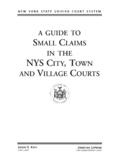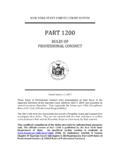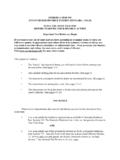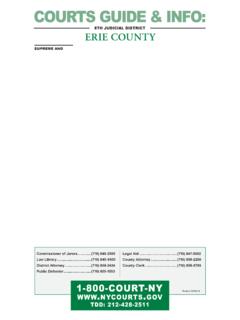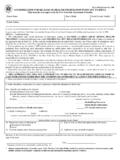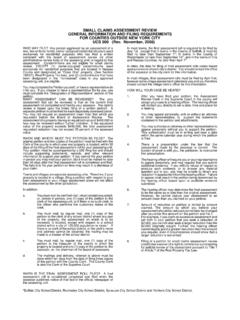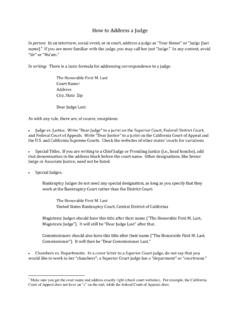Transcription of MESSAGE FROM CHIEF JUDGE JANET DIFIORE
1 1 MESSAGE FROM CHIEF JUDGE JANET DIFIORE January 31, 2022 Thank you for giving us a few minutes of your time for an update on the latest COVID developments affecting our courts and the justice system. Since my last report two weeks ago, the number of judges and court staff testing positive for COVID-19 has dropped dramatically, consistent with the metrics showing a significant decline in the number of COVID infections across the state. The downward trend is very encouraging, and we are hopeful that this means that the latest winter surge fueled by the Omicron variant has finally subsided, but one thing we ve learned over these past 22 months is not to take anything for granted when it comes to COVID-19. And so, we will stay vigilant and continue to enforce all of the health and safety protocols that have worked well to keep our courthouses safe. As the COVID metrics have improved, the operational pressures that some of our courts were experiencing due to isolation and quarantine have eased.
2 During the latest surge, our judges , staff, court leaders and managers did an outstanding job of responding to every 2 operational challenge presented. As a result of their good work, I am pleased to report that we experienced very little, if any, disruption in court access or productivity statewide. So, thank you, to all of them. I want to turn now for a moment to the serious problem of gun violence, which is reported to have become a crisis in many of our communities. Last week, Mayor Eric Adams announced a public safety plan to combat gun violence in New York City, and the court system is committed to doing its part to ensure the fair and timely adjudication of these serious cases filed in our courts. We have asked Deputy CHIEF Administrative JUDGE Deborah Kaplan, and JUDGE George Grasso, our Administrative JUDGE for Criminal Matters in Queens Supreme Court, to expand the multi-prong initiative that JUDGE Grasso has been overseeing since last August to reduce the backlog of felony gun possession cases in New York City.
3 JUDGE Kaplan has convened all of the Administrative judges who oversee criminal court operations in New York City, and is working with JUDGE Grasso in order to develop a n effective plan to prioritize and expedite the resolution of gun cases. Under the updated plan, teams of judges have been designated in each borough to expedite pretrial hearings and preside over pleas and trials, and we are making staffing and operational adjustments that will enable us to schedule more hearings 3 and trials in anticipation of an increased number of arrests and prosecutions involving charges of illegal gun possession. We are also reaching out to, and communicating with our justice partners, including all five District Attorneys, the defense bar and the Department of Correction, to ensure that we are all on the same page and working effectively to support the fair, prompt and appropriate resolution of these serious cases.
4 I want to thank JUDGE Kaplan and JUDGE Grasso for leading the court system s response on this important issue. Needless to say, we will be carefully monitoring and reporting back to you on the progress of this initiative. Now, turning to our busy Housing Courts, where, as many of you know, the pandemic-related moratorium on evictions expired on January 15, a little over two weeks ago. Since the expiration of the moratorium, we have seen a noticeable uptick in eviction filings in the New York City Housing Court. Our Housing Court judges and staff had been preparing for this eventuality for many months, and they are hard at work hearing and adjudicating these cases, which are being calendared both in-person and virtually, depending on what is most appropriate for each particular case. In New York City, JUDGE Carolyn Walker-Diallo, our Administrative JUDGE of the Civil Court, and the Supervising judges in each Borough, 4 are closely watching the foot traffic in our Housing Court facilities and making daily adjustments to court calendars in order to appropriately balance efficiency with safety.
5 Please be assured that we are carefully monitoring conditions and operations in Housing Court and will keep you apprised of significant developments. In the coming weeks, our focus as a court system will be on transitioning back to full-scale operations and resuming the historic successes of the Excellence Initiative, when we made dramatic progress to eliminate backlogs, improve efficiency and upgrade the quality of our services. And to help us restart the Excellence Initiative and achieve these important objectives, we have made two new appointments to our judicial leadership team. First, we have appointed JUDGE Tamiko Amaker to serve as Deputy CHIEF Administrative JUDGE for Management Support of the Unified Court System. In this statewide role, JUDGE Amaker will assist CHIEF Administrative JUDGE Larry Marks in the day-to-day administration and operation of our court system, with a double focus on addressing the continuing challenges presented by the pandemic and resuming the forward progress of the Excellence Initiative.
6 JUDGE Amaker is well-prepared to succeed in her new assignment. She is an experienced, talented and energetic leader who has done a 5 terrific job of leading the New York City Criminal Court as its Administrative JUDGE since 2018. In that role, she worked with judges and court staff to streamline operations, reduce backlogs and dramatically improve the performance of a court that had been struggling with systemic delays. So, we are looking forward to working with JUDGE Amaker in her new assignment, and we are grateful that she will continue in her role as the Administrative JUDGE of the New York City Criminal Court. I am also pleased to announce that JUDGE Toko Serita has been appointed to serve as our Statewide Coordinating JUDGE for Problem-Solving Courts. In this new role, JUDGE Serita will report to Deputy CHIEF Administrative JUDGE Edwina Mendelson and work closely with the Division of Policy and Planning to provide support, resources and guidance to the court system s problem-solving courts.
7 JUDGE Serita has a wealth of experience in this area, having sat in drug treatment, veterans and human trafficking courts in New York City, and she is a nationally recognized expert in the field of problem-solving courts. I have every confidence that JUDGE Serita will help us build on the enormous progress that we ve made as a system to develop effective court responses to a broad range of societal problems, including mental illness, issues experienced by our veterans and the national epidemic of opioid dependency. 6 So, please join me in congratulating and welcoming JUDGE Amaker and JUDGE Serita to their new positions. Now, t omorrow, as you know, is the first day of February, and February is Black History Month. We will kick off our annual month-long celebration of Black History with a special lunchtime program on Thursday, February 3rd: A Conversation Between Agents of Change.
8 And who are the agents of change participating in this conversation? They are Edwina Mendelson, Deputy CHIEF Administrative JUDGE for Justice Initiatives, and Norman St. George, our Deputy CHIEF Administrative JUDGE for the Courts Outside New York City. These two dynamic leaders will discuss the ongoing effort to remake our system into a model of fairness, access and inclusion, and will talk about how they have gone about engaging with our judges and staff across the state to operationalize Secretary Johnson s recommendations designed to transform our institutional culture from the ground up. And as part of the conversation, we ll also hear about their own unique career paths in the justice system, and how their lived experiences and professional journeys have informed their perspectives and prepared them to serve as agents for change. So, y ou are in for a terrific conversation, moderated by Tony Walters, our Director at the Office of Diversity and Inclusion, and I hope 7 that you will make it a point to register to attend, if your schedule and responsibilities permit.
9 I want to thank Tony Walters and our ODI staff for sponsoring this timely program in honor of Black History Month, and I want to thank JUDGE Mendelson and JUDGE St. George for graciously agreeing to participate. Thank you, once again, to all of you for listening, and for remaining disciplined in doing all that you can and should be doing to keep yourselves and those around you safe.
